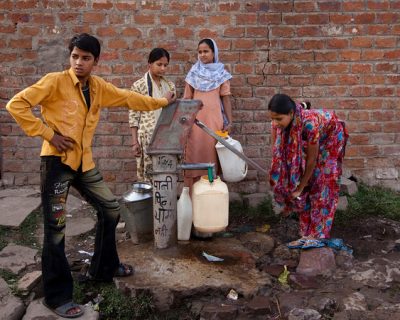
In a recent interim order, the Supreme Court acknowledged that another 20 housing colonies, near to the abandoned Union Carbide pesticide factory in Bhopal, have become affected by the spread of toxic chemicals into their groundwater. This brings the total number of affected colonies to 42 and, although it is difficult to put an exact number on the populations of those colonies, there is no doubt it would represent many tens of thousands of people.
In April a team from the Indian Institute of Toxicological Research (IITR), Lucknow, collected water samples from 20 settlements where groundwater has become toxic and unfit for human consumption. The water is contaminated by a slow, but steady flow of toxic chemicals leaching into the groundwater aquifer from waste abandoned at the Union Carbide factory site and at the ‘solar evaporation ponds’ just north of it.
Last Thursday, 14th June, another IITR team arrived to take further samples from the colonies while, for its part, the Bhopal Municipal Corporation claims to be working round-the-clock to ensure compliance to the Supreme Court order demanding it provide clean drinking water to the colonies.
But campaigners, including the Bhopal Group for Information and Action (BGIA), a member of the monitoring committee appointed by the Supreme Court, allege that piped supplies of clean water are not available to the affected colonies.
They maintain that the surest way to stop the spread of poisons would be to excavate and contain the poisonous factory waste that remains buried underground and is the source of the ongoing contamination. The contamination problem is growing, year by year and a proper contamination assessment is desperately required, followed by a full clean-up performed to accepted international standards.
Water Contamination briefing paper: https://www.bhopal.org/water-contamination-briefing/


